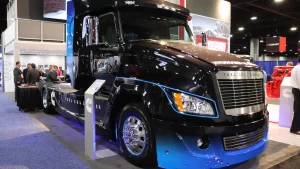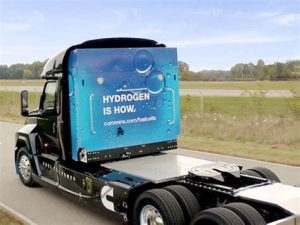Freightliner Partners With Cummins
Cascadia Hydrogen Fuel-Cell Truck
Imagine a truck with a range of up to 1000 kilometers only emits water vapor and generates its electricity. With hydrogen fuel cells, it has become a real possibility. Cummins and Daimler Truck North America (DTNA) have already begun testing vehicles with this innovative technology.
A joint effort between Cummins and Daimler Truck North America (DTNA) will see Freightliner Cascadia trucks outfitted and tested for the North American market with a hydrogen fuel cell powertrain from Cummins. The cooperative endeavor will help both firms achieve their aim of reducing emissions in their products and operations.
DTNA will utilize Cummins’ fourth-generation fuel cell powertrain to ensure enough units are available for their exclusive clients in 2024.
 Hydrogen Fuel-Cell Trucks Are The Future
Hydrogen Fuel-Cell Trucks Are The Future
Hydrogen fuel cells promise an exciting future for heavy-duty trucks, especially those requiring higher density energy and fast refueling capabilities.
Fuel cell electric vehicles (FCEVs) operate similarly to all-electric vehicles in that an electric motor is powered by electricity. Other EVs rely on batteries for their power supply, whereas FCEVs uses a hydrogen-powered fuel cell to generate energy.
During vehicle design, the manufacturer determines the vehicle’s power by the size of the electric motor(s) powered by the fuel cell and battery combination.
Most FCEVs employ the batteries for recapturing braking energy, delivering extra power during brief acceleration events, and smoothing the power produced by the fuel cell, with the ability to rest or switch off the fuel cell during periods of low power demand.
The capacity of the hydrogen fuel tank defines how much energy can be stored in the vehicle. In contrast, an all-electric vehicle’s power and energy availability directly correlate with the size of the battery.
 Fuel Cell Helps Reduce Emissions from Heavy-Duty Transport
Fuel Cell Helps Reduce Emissions from Heavy-Duty Transport
Since tailpipes of hydrogen fuel-cell vehicles only release water vapor, they qualify as a type of electric vehicle that produces no harmful emissions.
Compared to batteries, hydrogen gives a far higher specific power. Also, the lighter weight solves range and payload limitations with 100% battery propulsion. Moreover, when hydrogen is created using renewable energy, the vehicles are entirely emission-free from well-to-wheel.
Fueling an electric vehicle with hydrogen rather than a traditional battery solution allows it to travel farther on a single gasoline tank. Additionally, the duration needed to refill is nearly identical to that of diesel.
There are many benefits to using hydrogen technology to fuel trucks. For starters, it makes it easy for a truck to take routes where the maximum payload is important. They can easily take on long hauls of 300+ miles.
The only disadvantage of a battery-only approach is the time required for recharging. The recharging process demands the heavy-duty vehicle to be taken out of service. This process takes longer than merely refueling. Without a vehicle on the road, the fleet operator loses money and has to wait longer to get the product to its intended customer. Hydrogen Fuel-Cell trucks are the ultimate solution to this drawback.
Hydrogen fuel cells are a viable option for the rigorous needs of heavy-duty trucks. This collaboration between Cummins and Freightliner Trucks will help accelerate the transition to a carbon-free economy.
